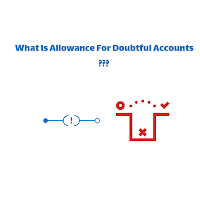What Is Allowance For Doubtful Accounts - Definition - Meaning - Calculation - Explanation

It is an Estimation either on Sales (Income Statement-Approach) or on Accounts Receivable (Balance Sheet-Approach) that some percentage of Accounts Receivable / Debtors or Sales may not be recovered from our customers in future. For More Details, You Can Study, "How To Write Off An Uncollectible Accounts Receivable". It is also called Provision for Doubtful Debts or Reserve For Doubtful Debts under
British Accounting System. Do You Know What Kind / Type of Account is Allowance For Doubtful Accounts? It is a Contra Asset Account which is deducted from the Closing Balance of Accounts Receivable on Balance Sheet.
How To Calculate Allowance For Doubtful Accounts Or Estimated Bad Debts Expense / Doubtful Debts?
For Example, if we sold goods to our Customers for Rs. 60000 on Credit Basis, then there are possibilities that some percentage of unpaid amount may not be recovered from Accounts Receivable,
so as a precautionary measure, we assume that 2% of Receivables may not be recovered based on the Accounts Receivable Aging Report. In this case, the following Accounting Journal Entry is passed in the book of us (Company):
Allowance For Doubtful Accounts / Provision For Doubtful Accounts Journal Entry In The Journal Or Book Of Company
Uncollectible Accounts Expense a/c 1200 (2% X 60000)
Allowance For Doubtful Accounts a/c 1200
(2% of Accounts Receivable Recorded as Allowance For Doubtful Accounts)
Here, Uncollectible Account Expense / Doubtful Debts is an estimated expense and it is recorded in the Income Statement / Profit & Loss Account during the Current Accounting Period
while Allowance For Doubtful Accounts is a Contra Asset Account which is deducted From Ending Balance of Accounts Receivable / Closing Debtors in Balance Sheet.
The Normal Balance For Allowance For Doubtful Accounts / Provision For Doubtful Debts is Credit. When it increases, it means it has Credit Balance as we more estimate than the Actual Bad Debts Written Off and when it Decreases, it has Debit Balance, because we lesser estimate than the total amount of unpaid dues, we need to adjust it to the actual amount of Bad Debts Written off.
We may make Ledger T Account Format or Self-Balancing Form for Recording Journal Entries Related to Allowance for Doubtful Accounts that is known as Allowance For Doubtful Accounts T Account. In this account, Previous year’s Balance becomes the Opening Balance while current Accounting Period’s Allowance for Doubtful Accounts is recorded in the Credit Side. The Difference of Debit And Credit Side gives us the Ending Balance for Allowance For Doubtful Accounts / Provision For Doubtful Debts.
OR
Is Allowance For Doubtful Accounts An Asset?
OR
What is the Position of Allowance For Doubtful Accounts On The Balance Sheet?
OR
What Kind of Account is Allowance For Doubtful Accounts?
OR
No, it is not an asset account but it is a Contra Asset Account which is the reversal of Accounts Receivable and this amount should be deducted from Ending Balance of Accounts Receivable on Balance Sheet during the Closing of Books of Accounts.
So, Allowance For Doubtful Accounts is a Contra Asset Account which makes the balance of Accounts Receivable in a reliable position and avoids over estimation of Sales by making a comparison
between Actual Sales and Estimated Sales.
Comments